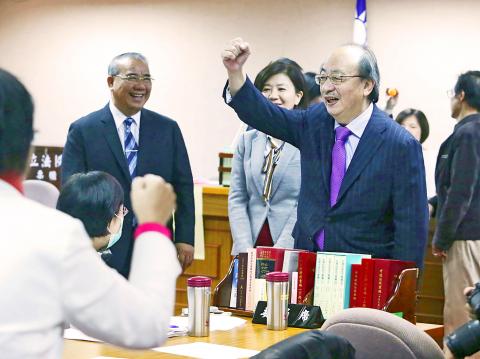The Democratic Progressive Party (DPP) yesterday secured the two convener seats for the legislature’s Judiciary and Organic Laws and Statutes Committee, which is expected to be the main battleground in the new legislative session amid the drives for pension reform and marriage equality.
DPP legislators Tuan Yi-kang (段宜康) and Tsai Yi-yu (蔡易餘) won the seats during the legislature’s committee convener elections.
Tuan, Tsai and Chinese Nationalist Party (KMT) Legislator Lin Wei-chou (林為洲) all received the same number of votes, so a drawing was held to break the tie.

Photo: CNA
Prior to the elections, the People First Party (PFP) gave up two of its seats on the committee to the KMT so that the KMT could compete for a convenor seat.
A committee convener has the right to arrange the review of legislative proposals, and the win by Tuan and Tsai could prove critical for the DPP government’s reform efforts.
The legislature has eight committees and each has two conveners; the DPP secured 11 of the convener seats.
DPP legislators Chiu Yi-ying (邱議瑩) and Gao Jyh-peng (高志鵬) were elected as the conveners of the Economics Committee, while their colleagues Cheng Pao-ching (鄭寶清) and Chen Ou-po (陳歐珀) won the Transportation Committee posts.
The DPP and KMT will share convener duties on five committees.
The DPP’s Pasuya Yao (姚文智) and the KMT’s William Tseng (曾銘宗) are to chair the Internal Administration Committee; Wang Ding-yu (王定宇) of the DPP and Johnny Chiang (江啟臣) of the KMT are to head the Foreign and National Defense Committee; the DPP’s Wang Jung-chang (王榮璋) and the KMT’s Lo Ming-tsai (羅明才) have the Finance Committee seats; the DPP’s Chen Ying (陳瑩) and the KMT’s Lee Yan-hsiu (李彥秀) are to call the shots for the Social Welfare and Environmental Hygiene Committee; and Hsu Chih-chieh (許智傑) of the DPP and Ko Chih-en (柯志恩) of the KMT are to head the Education and Culture Committee.
However, DPP caucus whip Ker Chien-ming (柯建銘) said the election results are not that important.
The party’s solidarity and its ability to communicate key policies are more important in pushing for pension, judicial and tax reforms as well as infrastructure budget proposals.
KMT caucus whip Sufin Siluko (廖國棟) said the KMT and the PFP share the same stance on the pension reform issue, and they would prevent the DPP from forcing through its reform plans.
In related news, the Cabinet and the DPP caucus yesterday thrashed out the bills to be put at the top of legislative agenda, which include amendments to laws governing the benefits of military personnel, public servants, public and private-school teachers and private-sector employees, and transitional justice proposals on political archives, promoting transitional justice, helping the development of Aboriginal languages and an amendment to the Status Act For Indigenous Peoples (原住民身分法).
Others on the list are related to economic development, urban renewal, tax reforms, long-term care and cross-strait relations, Cabinet spokesperson Hsu Kuo-yung (徐國勇) said.
As for the marriage equality proposals, the DPP caucus decided not to list them as urgent bills until there is further consensus among the DPP lawmakers.
Additional reporting by Lee Hsin-fang and CNA

A preclearance service to facilitate entry for people traveling to select airports in Japan would be available from Thursday next week to Feb. 25 at Taiwan Taoyuan International Airport, Taoyuan International Airport Corp (TIAC) said on Tuesday. The service was first made available to Taiwanese travelers throughout the winter vacation of 2024 and during the Lunar New Year holiday. In addition to flights to the Japanese cities of Hakodate, Asahikawa, Akita, Sendai, Niigata, Okayama, Takamatsu, Kumamoto and Kagoshima, the service would be available to travelers to Kobe and Oita. The service can be accessed by passengers of 15 flight routes operated by

Chinese spouse and influencer Guan Guan’s (關關) residency permit has been revoked for repeatedly posting pro-China videos that threaten national security, the National Immigration Agency confirmed today. Guan Guan has said many controversial statements in her videos posted to Douyin (抖音), including “the red flag will soon be painted all over Taiwan” and “Taiwan is an inseparable part of China,” and expressing hope for expedited reunification. The agency last year received multiple reports alleging that Guan Guan had advocated for armed reunification. After verifying the reports, the agency last month issued a notice requiring her to appear and explain her actions. Guan

GIVE AND TAKE: Blood demand continues to rise each year, while fewer young donors are available due to the nation’s falling birthrate, a doctor said Blood donors can redeem points earned from donations to obtain limited edition Formosan black bear travel mugs, the Kaohsiung Blood Center said yesterday, as it announced a goal of stocking 20,000 units of blood prior to the Lunar New Year. The last month of the lunar year is National Blood Donation Month, when local centers seek to stockpile blood for use during the Lunar New Year holiday. The blood demand in southern Taiwan — including Tainan and Kaohsiung, as well as Chiayi, Pingtung, Penghu and Taitung counties — is about 2,000 units per day, the center said. The donation campaign aims to boost

The Central Weather Administration (CWA) said a magnitude 4.9 earthquake that struck off the coast of eastern Taiwan yesterday was an independent event and part of a stress-adjustment process. The earthquake occurred at 4:47pm, with its epicenter at sea about 45.4km south of Yilan County Hall at a depth of 5.9km, the CWA said. The quake's intensity, which gauges the actual effects of a temblor, was highest in several townships in Yilan and neighboring Hualien County, where it measured 4 on Taiwan's seven-tier intensity scale, the CWA said. Lin Po-yu (林柏佑), a division chief at the CWA's Seismological Center, told a news conference